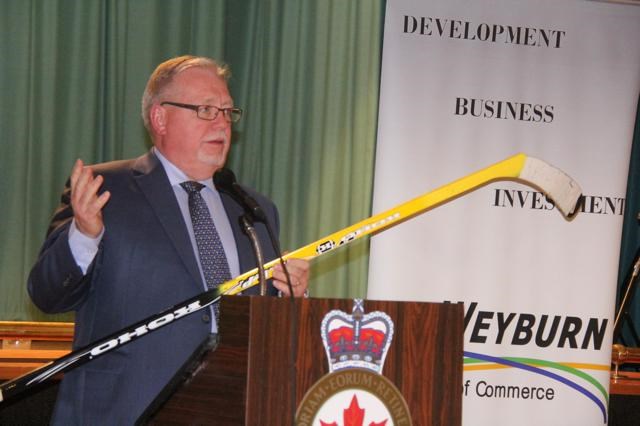By Greg Nikkel
Issues ranging from the property tax system and strengthening the education system to supporting infrastructure enhancement need to be discussed during the current provincial election, said Steve McLellan, CEO of the Saskatchewan Chamber of Commerce.
He was the keynote speaker at the Weyburn Chamber’s annual President’s Dinner and annual meeting held on Wednesday evening at the Legion Hall.
With the provincial election underway, the Saskatchewan Chamber has put out their viewpoints on several issues, entitling it “Ontrack 2016”.
Other issues addressed in the “Ontrack” documents include attracting and growing investment in the province, enhancing workforce skills training, and building and utilizing the province’s water resources better.
On property tax, the Sask. Chamber would like to see the assessment cycle used to calculate property value changed from every four years to every two years. In education, the Chamber would like to see every high school student take at least one entrepreneurship course, and every student should complete a personal finance course on the basics such as debt, credit and cash management.
McLellan spoke on the issue of privatizing Saskatchewan’s liquor board stores, which the NDP is strongly opposing.
“We believe the provincial liquor board system could be privatized. There’s no reason why we should lose money as a province,” said McLellan, pointing out that the province’s biggest private liquor store is owned by the Co-op in Saskatoon, and offers a range of 4,500 products, compared to 2,500 at the biggest provincially-run liquor store.
The Chamber would also like to see the Saskatchewan Farm Security Act, which governs ownership of farmland, changed to allow Canadian pension funds to buy farmland.
On the issue of labour and workforce skills training, McLellan said if there is proper forethought taken to train skilled workers, they could avoid the need to import large numbers of immigrants to fill vacant labour positions if and when the strong economy rebounds.
On that note, McLellan said Saskatchewan’s economy is one of the strongest in Canada and is continuing to grow, in spite of what “Chicken Littles” are saying about the economic downturn. Bringing out a hockey stick to use as a visual reference, he angled it up to resemble the upward of a graph and spoke of where Saskatchewan’s economy is right now.
“It isn’t what it was two years ago, and that’s fine. The ‘Chicken Littles’ will complain that ‘the sky is falling, the sky is falling’, but they’re not saying what they will do about it,” said McLellan.
He acknowledged there have been layoffs in the province, particularly in the oil sector, but pointed out, “We’re still leading the country. In fact, we are still selling more than B.C., dollar for dollar, and more than Alberta on a per capita basis to the world, and we have no port. How amazing is that?”
Retail sales have been up and down, he said, and while “they are not where they’d like to be, they’re still doing okay, generally speaking.”
Looking at another economic indicator, the debt-to-GDP (gross domestic product) ratio, McLellan said it’s “scary” in other provinces, but in Saskatchewan, the province has the lowest or second lowest ratio in the country.
“Nobody likes to spend more than they make, but we’re going to be okay,” he said, noting that spending is going into things like the infrastructure.
Noting the province’s population has continued to grow, he asked, “How can the world be falling apart if we’re still growing? It really hasn’t slowed down very much.”
Farm receipts is another positive factor for Saskatchewan, he said, noting they have gone up by seven per cent from last year.
“Saskatchewan people have led the way,” said McLellan, and indicating with the hockey stick angled upwards he added, “We are way up here compared to where we used to be.”




